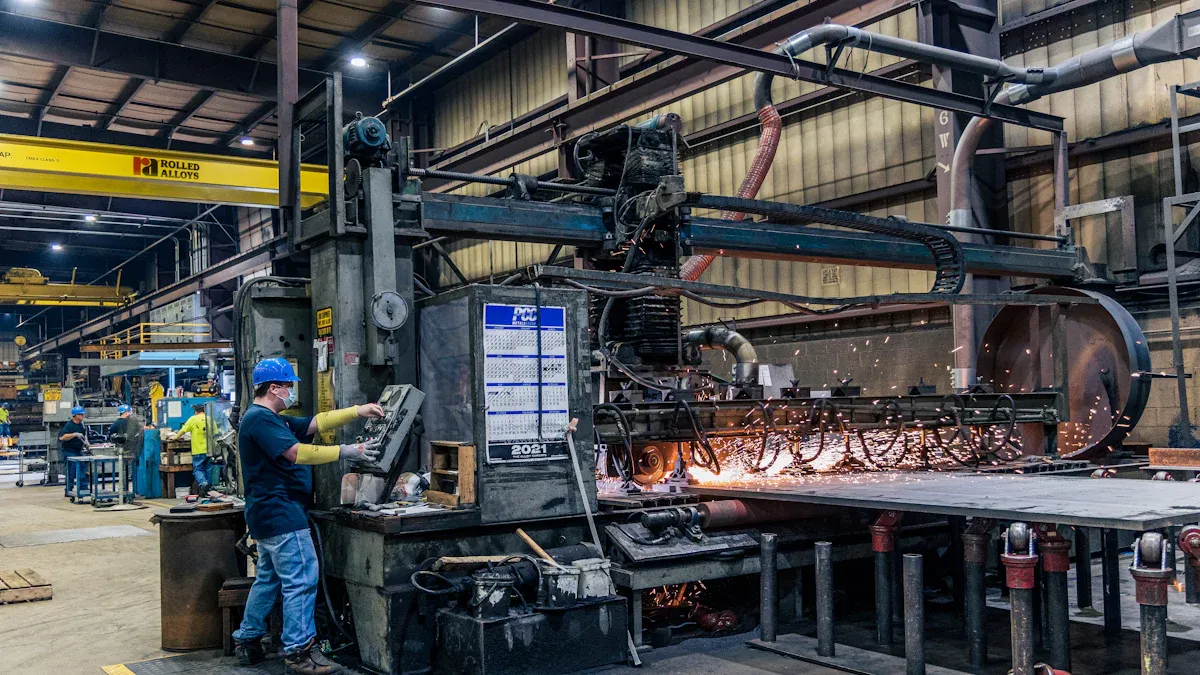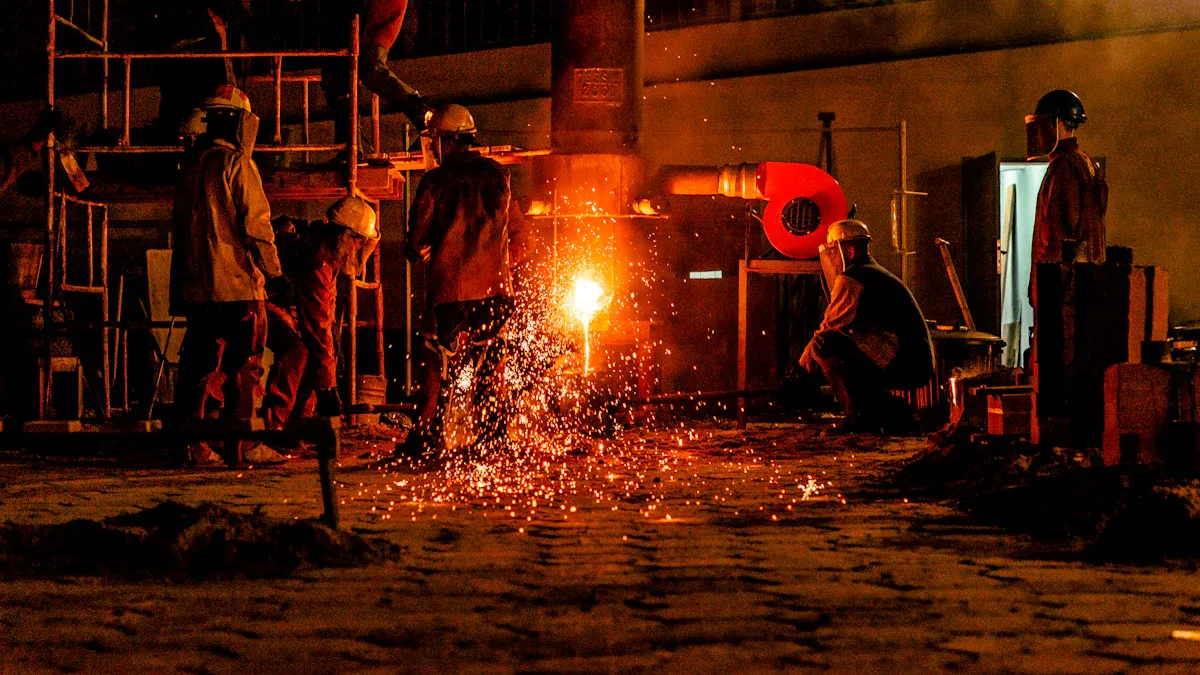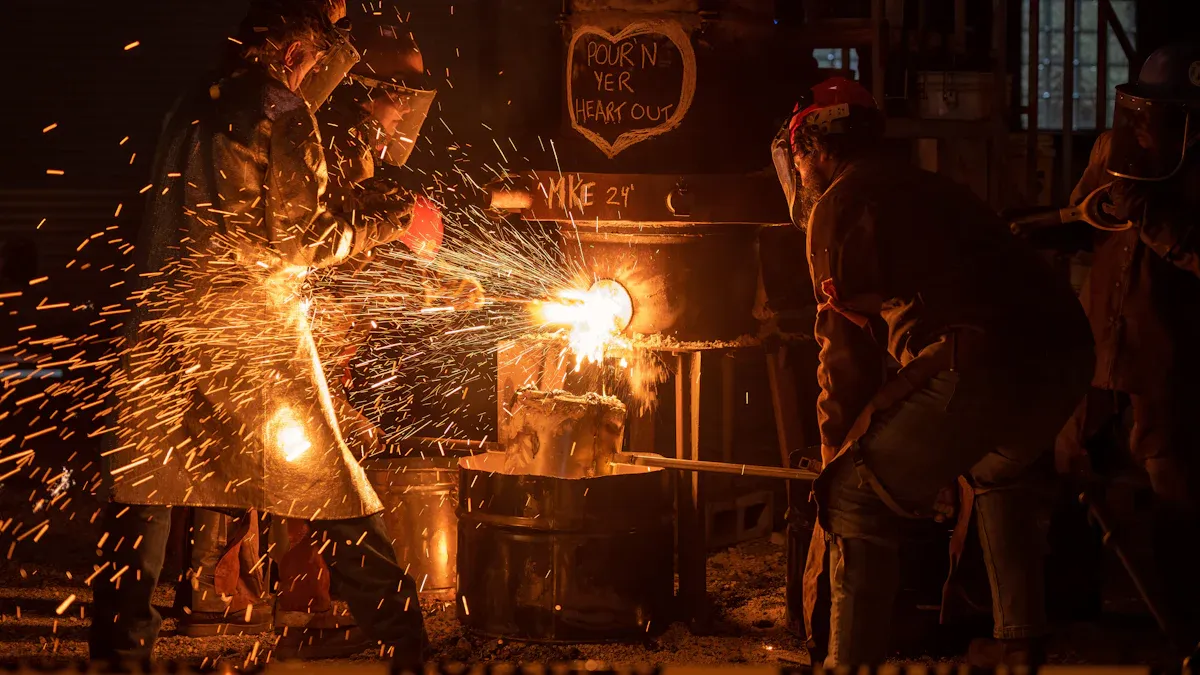
Choosing the right supplier for aluminum die casting isn’t just about placing an order. It’s about finding a partner who understands your project’s needs and delivers consistent results. Whether you’re sourcing aluminium die casting components for automotive parts or industrial equipment, the supplier you pick directly impacts quality and timelines. Not all aluminium die casting companies are created equal, so you need to look for one that aligns with your goals. A reliable partner can save you time, reduce costs, and help your project succeed.
Key Takeaways
- Focus on quality by checking certifications and testing methods for good parts.
- Look at the supplier’s experience and reputation to find a reliable partner.
- Check if the supplier can handle your needs now and later.
- See what services they offer to make work easier and use fewer vendors.
- Think about the value and benefits to get the most from your money and build a lasting partnership.
Assess Quality Standards

When choosing an aluminum die casting supplier, quality should always be your top priority. High-quality parts ensure your project runs smoothly and meets your expectations. Here’s how you can assess a supplier’s quality standards.
Certifications and Compliance
Start by checking if the supplier holds relevant certifications. Certifications like ISO 9001 or IATF 16949 show that the company follows strict quality management systems. These certifications aren’t just fancy labels—they prove the supplier meets industry standards. You should also confirm that the supplier complies with any specific regulations for your industry. For example, if you’re in the automotive or aerospace sector, compliance with safety and environmental standards is critical. Don’t hesitate to ask for proof of these certifications.
Inspection and Testing Processes
A reliable supplier doesn’t just promise quality—they prove it through rigorous inspection and testing. Ask about their quality control processes. Do they inspect every batch of aluminum die cast parts? What kind of testing equipment do they use? Advanced tools like X-ray machines or coordinate measuring machines (CMM) can ensure precision and detect flaws. Regular testing helps catch defects early, saving you time and money. Make sure the supplier has a clear process for addressing any issues that arise during production.
Consistency in Product Quality
Consistency is key when it comes to aluminum die casting. You don’t want parts that vary in size, shape, or strength. Look for a supplier with a proven track record of delivering consistent results. You can ask for samples or review past projects to see the quality of their work. Reading client testimonials or case studies can also give you insight into their reliability. A supplier who consistently delivers high-quality parts will help you avoid costly delays and rework.
Tip: Always communicate your quality expectations clearly. A good supplier will work with you to meet your standards.
Evaluate Experience and Reputation
When choosing an aluminum die casting supplier, their experience and reputation can tell you a lot about what to expect. A supplier with a strong track record is more likely to deliver reliable results. Let’s break this down into three key areas you should focus on.
Industry-Specific Experience
Does the supplier have experience in your industry? This is a question you need to ask early on. A supplier who understands the unique challenges of your field can save you a lot of headaches. For example, if you’re in the automotive sector, you’ll want a supplier who knows how to meet strict safety and performance standards. The same goes for industries like aerospace or electronics. Their familiarity with your industry ensures they can handle your project’s specific needs.
You can also ask about the types of projects they’ve worked on before. Have they produced aluminum die cast parts similar to what you need? If they’ve done it before, they’re more likely to do it well again. Don’t hesitate to dig into their history—it’s worth it.
Case Studies and Client Testimonials
A good supplier will have proof of their success. Case studies and client testimonials are great ways to see what they’ve accomplished. Case studies often highlight how the supplier solved a problem or delivered a complex project. These examples can give you confidence in their abilities.
Client testimonials, on the other hand, offer a glimpse into their customer relationships. Look for feedback about quality, communication, and delivery times. If other clients are happy with their work, there’s a good chance you will be too. You can usually find these on the supplier’s website or by asking them directly.
Pro Tip: If possible, ask for references. Speaking with past clients can give you an honest view of what it’s like to work with the supplier.
Check Production Capacity and Scalability

When choosing an aluminum die casting supplier, you need to ensure they can handle your production needs today and in the future. A supplier’s capacity and scalability directly affect your project’s success. Let’s explore what you should look for.
Current Production Capabilities
Start by asking about the supplier’s current production capabilities. Can they meet your order size without compromising quality? Some suppliers specialize in small batches, while others excel at high-volume production. You should also check their equipment and technology. Modern machinery often produces more precise and consistent parts. If the supplier uses outdated equipment, it could lead to delays or defects. Don’t forget to ask about their workforce. A skilled team ensures smooth operations and fewer errors.
Tip: Visit the supplier’s facility if possible. Seeing their operations firsthand can give you confidence in their capabilities.
Scalability for Future Needs
Your project might grow over time, so you need a supplier who can scale with you. Ask if they can increase production volumes when needed. Some suppliers struggle to adapt to larger orders, which can slow down your progress. You should also check if they have room to expand their operations. A supplier with flexible capacity is better equipped to handle your future needs. Scalability isn’t just about quantity—it’s also about maintaining quality as production increases.
Lead Times and Delivery Reliability
Timely delivery is crucial for keeping your project on track. Ask about the supplier’s lead times and how they manage deadlines. Do they have a history of delivering on time? Reliable suppliers often have systems in place to avoid delays, like inventory management and efficient logistics. You should also consider their location. A supplier closer to your business can reduce shipping times and costs. Consistent delivery ensures you won’t face unexpected setbacks.
Note: Clear communication about your timelines helps the supplier plan effectively.
Review Range of Services Offered
When choosing an aluminum die casting supplier, it’s not just about their ability to produce parts. You also want to know what additional services they offer. A supplier with a broad range of services can save you time, reduce costs, and simplify your workflow. Let’s dive into what to look for.
Full-Service Capabilities
A full-service supplier can handle your project from start to finish. This means they don’t just cast the parts—they also assist with design, prototyping, and post-production processes. For example, some suppliers offer design-for-manufacturability (DFM) support. This helps you optimize your designs for better performance and lower costs.
You should also ask if they provide assembly services. A supplier who can assemble components for you eliminates the need to work with multiple vendors. This streamlines your operations and reduces the risk of errors.
Tip: Look for a supplier who acts as a one-stop shop. It’s easier to manage one partner than juggling several.
Secondary Processes and Customization
Die casting is just one part of the process. Many projects require secondary operations like machining, surface finishing, or heat treatment. A supplier who offers these services in-house can save you the hassle of outsourcing.
Customization is another big factor. Can the supplier tailor parts to meet your exact specifications? Whether it’s a unique alloy, a specific coating, or tight tolerances, their ability to customize ensures your parts meet your needs.
Note: Ask about their experience with secondary processes. A skilled supplier will deliver high-quality results without compromising deadlines.
Flexibility in Production Methods
Every project is different, so flexibility matters. Some suppliers specialize in high-volume production, while others excel at small, custom runs. You need a partner who can adapt to your project’s size and complexity.
Also, check if they offer multiple casting methods, like gravity die casting or sand casting, in addition to aluminum die casting. This versatility can be a game-changer if your project evolves or requires different techniques.
Pro Tip: A flexible supplier can adjust to your changing needs, ensuring your project stays on track no matter what.
By reviewing the range of services a supplier offers, you’ll find a partner who not only meets your current needs but also supports your long-term goals.
Consider Value and ROI
When choosing an aluminum die casting supplier, you need to think beyond the upfront costs. The right supplier offers value that goes beyond price tags. Let’s explore how to balance cost and quality, build long-term partnerships, and ensure cost efficiency.
Balancing Cost and Quality
Cheaper isn’t always better. You might save money upfront, but poor-quality parts can lead to expensive fixes later. A good supplier strikes the right balance between cost and quality.
Ask yourself: Are they offering competitive pricing without cutting corners? Look for suppliers who use high-quality materials and advanced equipment. These factors ensure durable and reliable parts.
Tip: Compare quotes from multiple suppliers, but don’t just pick the lowest one. Focus on the value they bring to your project.
Long-Term Benefits of the Partnership
Think of your supplier as a partner, not just a vendor. A strong partnership can save you time and money in the long run. Reliable suppliers help you avoid delays, reduce waste, and improve efficiency.
You should also consider their commitment to innovation. Suppliers who invest in new technologies can offer better solutions as your needs evolve. Building a long-term relationship with such a supplier ensures they understand your goals and can adapt to your future projects.
Pro Tip: A supplier who grows with you is worth their weight in gold. Look for one who values collaboration and continuous improvement.
Commitment to Cost Efficiency
A great supplier doesn’t just deliver quality—they help you save money over time. Ask about their strategies for reducing costs. Do they optimize production processes? Can they suggest design changes to lower expenses?
Suppliers who focus on efficiency can help you get the most out of your budget. They’ll work with you to find cost-effective solutions without sacrificing quality.
Note: Cost efficiency isn’t just about saving money. It’s about maximizing the return on your investment.
By considering value and ROI, you’ll find a supplier who supports your success both now and in the future.
Choosing the right aluminum die casting supplier doesn’t have to feel overwhelming. Remember these five key tips:
- Focus on quality standards to ensure reliable parts.
- Look for experience and reputation to find a trusted partner.
- Check production capacity to meet your current and future needs.
- Review their range of services for added convenience.
- Consider value and ROI to maximize your investment.
Pro Tip: Take time to research, ask for referrals, and communicate directly with potential suppliers. These steps will help you find a partner who truly aligns with your project goals.
By following these tips, you’ll set yourself up for success!
FAQ
What industries commonly use aluminum die casting?
Aluminum die casting is widely used in industries like automotive, aerospace, electronics, and consumer goods. Its strength, lightweight properties, and ability to create complex shapes make it ideal for these sectors.
Tip: If your industry isn’t listed, ask potential suppliers about their experience with your specific needs.
How do I verify a supplier’s certifications?
Ask the supplier for documentation of their certifications, such as ISO 9001 or IATF 16949. You can also check their website or request references from past clients to confirm compliance.
Note: Certifications ensure the supplier meets industry standards for quality and reliability.
Can a supplier handle both small and large production runs?
Many suppliers specialize in either small or large runs, but some offer flexibility for both. Always ask about their production capacity and scalability to ensure they can meet your current and future needs.
What should I look for in client testimonials?
Focus on feedback about quality, communication, and delivery reliability. Testimonials that highlight problem-solving and long-term partnerships can give you confidence in the supplier’s capabilities.
Pro Tip: Reach out to past clients for firsthand insights.
How can I ensure cost efficiency without sacrificing quality?
Choose a supplier who balances competitive pricing with high-quality materials and processes. Ask about their strategies for reducing costs, such as design optimization or efficient production methods.
Emoji Tip:
Post time: May-16-2025
